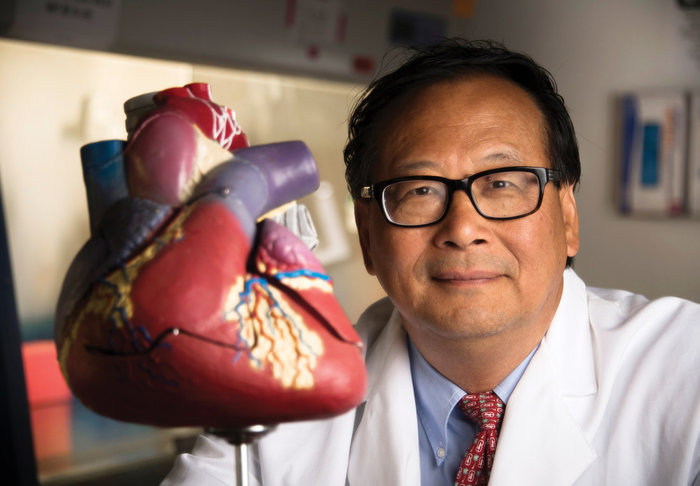BIRMINGHAM, Ala. – Twenty years ago, clinicians first attempted to regenerate a failing human heart by injecting muscle myoblasts into the heart during a bypass operation. Despite high initial hopes and multiple experimental and clinical studies since then, outcomes have been neutral or marginally positive for a wide variety of efforts to remuscularize an injured heart.

Credit: UAB
BIRMINGHAM, Ala. – Twenty years ago, clinicians first attempted to regenerate a failing human heart by injecting muscle myoblasts into the heart during a bypass operation. Despite high initial hopes and multiple experimental and clinical studies since then, outcomes have been neutral or marginally positive for a wide variety of efforts to remuscularize an injured heart.
The challenge is this: A heart attack kills heart muscle cells, leading to a scar that weakens the heart, often causing eventual heart failure and death. The lack of muscle repair is due to the very limited ability of mammalian heart muscle cells to proliferate, except during a brief period around birth.
Yet hope remains that current and future strategies will yield clinical regenerative heart therapies, especially due to rapidly emerging technologies in the field of cardiovascular tissue engineering.
This progress is highlighted in a book co-edited by University of Alabama at Birmingham researcher Jianyi “Jay” Zhang, M.D., Ph.D., titled “Advanced Technologies in Cardiovascular Bioengineering.” The 407-page e-book version, published by Springer Nature, has already been downloaded more than 2,000 times. The book is also available in hardcover and softcover.
Twenty articles by numerous contributors are grouped into five chapters: Cardiac Development and Morphogenesis, Cellular Approaches to Cardiac Repair and Regeneration, Genetic Approaches to Study Cardiac Differentiation and Repair, Bioengineering Approaches to Cardiovascular Tissue Modeling and Repair, and Clinical Perspectives.
Topics include induced pluripotent stem cell technologies, nanotechnologies, nanomedicine, advanced biomanufacturing, 3D culture systems, 3D organoid systems, genetic approaches to cardiovascular tissue engineering and organs-on-a-chip.
Zhang is chair of Biomedical Engineering at UAB, a joint department of the School of Engineering and the Marnix E. Heersink School of Medicine. Under Zhang’s direction since 2015, this UAB department has been a leader in the field of cardiovascular bioengineering.
Co-editor with Zhang is Vahid Serpooshan, Ph.D., assistant professor of biomedical engineering and pediatrics at Emory University and the Georgia Institute of Technology, Atlanta.
At UAB, Zhang holds the T. Michael and Gillian Goodrich Endowed Chair of Engineering Leadership.
DOI
10.1007/978-3-030-86140-7




